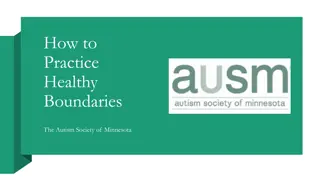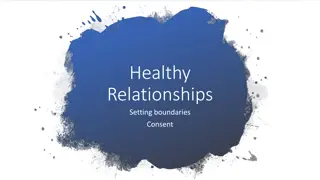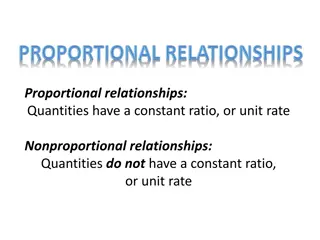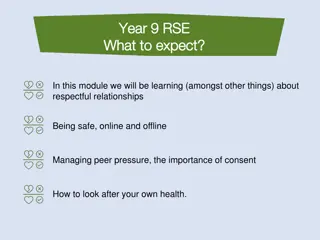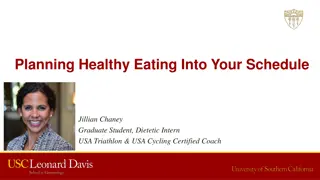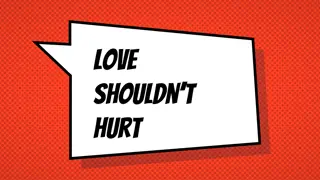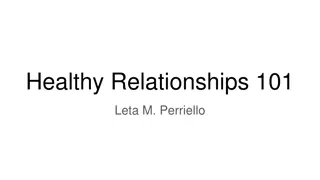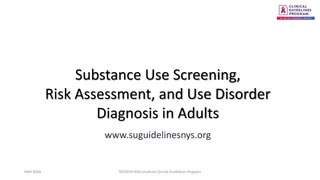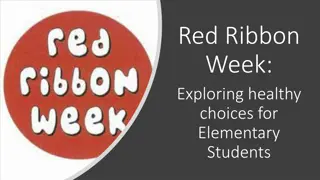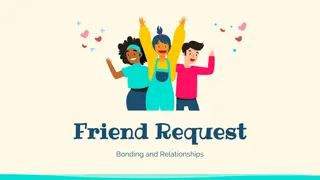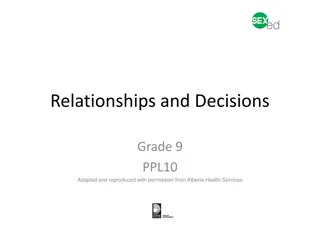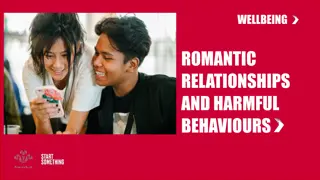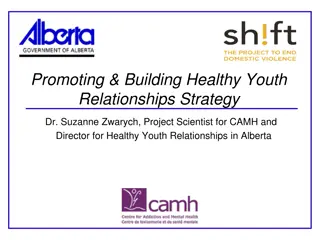Understanding Healthy and Unhealthy Relationships
Explore the characteristics of healthy relationships where partners listen, respect, trust, and support each other. Learn to identify signs of unhealthy and abusive relationships through behaviors like control, manipulation, and violence. Recognize the importance of communication, boundaries, and mutual respect in fostering positive and safe connections.
Download Presentation

Please find below an Image/Link to download the presentation.
The content on the website is provided AS IS for your information and personal use only. It may not be sold, licensed, or shared on other websites without obtaining consent from the author. Download presentation by click this link. If you encounter any issues during the download, it is possible that the publisher has removed the file from their server.
E N D
Presentation Transcript
CALM Relationships
Healthy Relationships In a healthy relationship, your partner will: Listen to you and take your feelings and ideas seriously Talk openly and honestly with you about what matters to them Respect you, and say good things to you and about you Enjoy spending time with you, and show it whether alone with you or in a group
Healthy Relationships In a healthy relationship, your partner will: Trust you, and earn your trust by keeping your private information private Encourage you to enjoy the activities and people that matter to you Accepts your limits about sexual activity, every time
Unhealthy Relationships Believing one person has more rights than the other Shouting or yelling when you are angry at your partner Using the silent treatment Pestering your partner until you get what you want Pouting to get what you want Excessive calling, texting or emailing
Abusive Relationships Questions that Help Identify an Abusive Relationship Are you frightened by your partner s temper? Are you afraid to disagree? Are you constantly apologizing for your partner s behaviour, especially when they treated you badly? Do you have to justify everything you do, every place you go, or every person you see to avoid your partner s anger? Does your partner put you down, but then tell you that they love you?
Abusive Relationships Questions that Help Identify an Abusive Relationship Have you ever been hit, kicked, shoved, or had things thrown at you? Do you avoid seeing friends or family because of your partner s jealousy? Are you afraid to break up because your partner has threatened to post personal photos of you online? Have you been forced into having sex when you didn t want to? Are you afraid to break up because your partner has threatened to hurt you or themselves?
Types of Communication Assertive Stand up for their rights without denying other people theirs Respect themselves as well as others Ask for what they want in a straightforward manner Express their emotions (both positive and negative) in a healthy manner
Types of Communication Passive Give in and say yes even when they don t want to Put the feelings and concerns of others before their own Does not share/say their concerns
Types of Communication Aggressive Think of themselves first, at the expense of others Dominate others Use threats or force
Safety Planning for Teens Tips if you are in or leaving an abusive relationship: Stay in touch with friends and involved in activities. Keep important phone numbers with you at all times. Consider telling your parents, teachers or other trusted adults. Set up a code word with friends or parents for danger.
Safety Planning for Teens Tips if you are in or leaving an abusive relationship: Consider talking to police and/or a shelter about your situation. Try not to be alone with your partner. When with your partner, keep in mind warning signs that tell you when things may become abusive. If you think you are in danger, LEAVE!
Safety Planning for Teens Tips if you are in or leaving an abusive relationship: Make sure someone knows where you are and when you ll be home. Always have your cell phone close by or know where the nearest phone is. If you decide to break up, do it in a public place. Have friends or parents wait for you near by. Take your cell phone with you if possible.
If You Think Your Friend Is Being Abused Listen to what your friend has to say. Believe them. Let your friend know why you are concerned. Be specific. Refer to incidents you have personally witnessed instead of what you have heard from others. Remind your friend that jealousy and possessiveness do not equal love.
If You Think Your Friend Is Being Abused Don t tell your friend that it is wrong if they choose to stay in the relationship. Keep listening, talking and challenging your friend to think about what to do. If your friend chooses not to leave, help create a safety plan. Continue to be a friend even in the times when you feel frustrated by decisions or actions. Your friend needs you!
If You Think Your Friend Is Being Abused Tell your friend, You are not to blame. Remind them it is the partner who is choosing this behaviour. Mention other people your friend might talk to: a counsellor, a teacher, another adult they trust or a community agency. Talk to a trusted adult for help and support.
If You Think Your Friend Is Being Abusive Be specific about what you say and how it made you feel. Take a stand. Remember early signs of abuse may include jealousy or possessiveness. Challenge your friend s stereotyping and putdowns of people. Don t laugh at jokes or comments that make fun of people.
If You Think Your Friend Is Being Abusive Talk about the consequences of violence. Abusive behaviour builds fear, not love. Physical and sexual assault are against the law. Talk to a trusted adult for help and support.
Resources Kids Help Phone 1-800-668-6868 or kidshelpphone.ca Alberta One Line for Sexual Violence 1-866-403-8000 Association of Alberta Sexual Assault Services www.aasas.ca Call Health Link at 811
CALM STBBIs
Video Demonstration Links Condom Vaginal Condom Dental Dam
Effectiveness Pregnancy Prevention (Typical use) * Method STI Protection Abstinence Injection Pill/ Patch/ Ring Implant Condom ** Emergency Contraception IUD Vaginal Condom Withdrawal No Method = None = Fair = Good = Excellent
CALM Birth Control
Birth Control Effectiveness 100 Abstinence 99.95 Implant 99.8 IUD - Hormonal 99.2 IUD - Copper Method 94.0 Injection 91.0 Pill/Patch/Ring 82.0 Condom 79.0 Vaginal Condom 78.0 Withdrawal 15.0 Chance 0.0 20.0 40.0 60.0 80.0 100.0 Typical Use % Effectiveness
Birth Control Effectiveness 100 Abstinence 100 99.95 Implant 99.95 99.85 Vasectomy 99.95 99.8 IUD - Hormonal 99.8 99.5 Tubal Ligation 99.5 99.2 IUD - Copper 99.2 Method 94.0 Birth Control Injection 99.8 91.0 Pill/Patch/Ring 99.7 82.0 Condom 98.0 79.0 Vaginal Condom 95.0 78.0 Withdrawal 96.0 76.0 Fertility Awareness Based 95.0 72.0 Spermicides 82.0 15.0 Chance 15.0 0.0 10.0 20.0 30.0 40.0 50.0 60.0 70.0 80.0 90.0 100.0 Effectiveness (%) Typical Use Perfect Use
Menstrual Cycle This diagram shows a menstrual cycle of 28 days, which is an average. Cycles can vary between 24-38 days long.
CALM Personal Values and Decision Making
How to Know Your Values Is this something that s important to you? Do you feel good about this being important to you? Would you feel good if people you respect knew that this was important to you? Have you ever done anything that indicates that this is important to you? Is this something you would stand by even if others made fun of you for it? Does this fit in with your vision of who you are?
A Model for Decision Making 1. Define the problem 2. Generate at least three options 3. Analyze the consequences 4. Make the choice 5. Reflect on your decision
Talking about Sex Set Goals and Limits Think about how far you want to go and set your own limits. Don t do anything you don t want to do. Use assertive communication. Make sure your partner knows how you feel and will respect the limits you set.
Talking about Sex Help Prevent STIs If you or your partner has had sex before, get tested for STIs. Use a condom/vaginal condom/dental dam every time you have sex.
Talking about Sex Help Prevent Pregnancy Talk to your partner before you have sex about birth control. Choose an effective method that you will use correctly and consistently.
Talking about Sex I don t think I am ready. Now what? SAY NO! You have the right to say no to sex and you should not feel guilty about your decision. You have more time to think and talk about your relationship with your partner.
Talking about Sex I am ready but my partner isn t. Now what? Accept your partner s no . They have the right to say no to sex and have that decision be respected. Rejection can hurt, but how you respond to it matters. It is okay to feel hurt, sad, disappointed, angry, confused etc. But it is not your partner s responsibility to make you feel better. Take time for yourself if you need it. Give your self credit for being vulnerable and taking the emotional risk of asking. These experiences can be opportunities for growth. If you are having trouble respecting the boundaries of others, you have a responsibility to ask for help.


